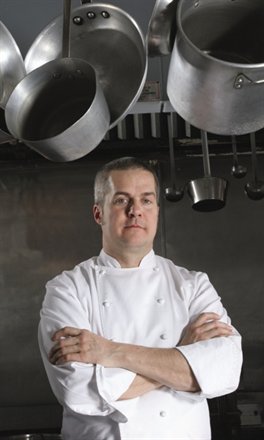Greg Christian
Greg Christian became a food sustainability consultant for cultural institutions quite by accident. His original plan was on the other side of the equation: help food-service providers green their operations so they could get more institutional clients who were looking for sustainable food vendors.
Mr. Christian, a Chicago-based chef and caterer for close to 20 years, was concerned about the stressful impact the food supply and distribution system was having on the natural resources of our planet.
Mr. Christian targeted food purveyors as a good place to start educating others about sustainability issues. He was convinced most food-service providers, restaurants and caterers — even the ones that say they follow green practices — really weren’t doing much in that regard.
Mr. Christian set up a consulting firm in Chicago to offer his expertise in helping food-service operations change the way they source food, use resources when preparing it and dispose of the waste that’s left over
He started pitching a program to operators based in Chicago and elsewhere. To his surprise, companies told him they already had that figured out and weren’t interested in his services.
Undeterred, he switched gears and found a new audience that was keen on tapping his knowhow to boost their own sustainability profiles: the institutions that hire the food-service providers to feed visitors and workers on their premises.
Earlier this month, the Field Museum announced it was teaming up with Mr. Christian’s firm to launch a 10-year food sustainability program. The program, “Beyond Green: Sustainable Foodservice for Cultural Institutions,” will be part of its contracting process to hire in-house restaurants. Requests for proposals for new food-service contracts the Field Museum is sending out this month incorporate requirements recommended in Mr. Christian’s program. Restaurants that are awarded new contracts will have to prove they are delivering their sustainable promises.
Crain’s met up with Mr. Christian to learn more about the program he developed and who else he’s hoping to inspire to care more about food sourcing and what happens to the leftovers.
Crain’s: What makes this program you developed so unique for institutions that want to be more conscientious about going green?
Mr. Christian: Right now, the food-service companies lead the sustainability initiatives. They tell the new customer what they’re going to do. This program reverses that, where the institution owns and designs the sustainability strategy that gets into the contract and forces the food-service company to execute. It’s new thinking. Everyone battles for the bid, so why not have an institution-led sustainability strategy?
What are some of the strongest elements of the program?
There’s 100 different goals in this program we designed for the Field Museum, all with measurable data that can be monitored. The food-service companies will have to send in sheets proving they’re following the sustainable requirements and hitting the goals. There’s a lot of goals around food sourcing — 65% of their supply has to be sustainable food and 25% of the total has to come from local sources. We ease them into the 65% over the 10 years.
Why are you targeting cultural institutions with your program?
Cultural institutions are adding “green” to their mission, and once the energy savings stuff is in place, they don’t know what to do next. So they’re open to the conversation about sustainability in their food, but they don’t know anything about it. They’ve been letting the food-service companies dictate to them what green is.
Signing a contract to make a vendor go green is attractive to them. They can tell the board they’re working on going green, and they’re not using their own resources to do this.
How rigorous is your program? And will organizations save money with the contracts you design?
The food-service providers have to measure stuff every year. We set up a monitoring system, and we deliver a quarterly or annual report card to the institution that tells them how the food-service company is doing in all the different categories, including recycling, sending compost to the compost services, donating food, and how much waste they’re really diverting from landfills.
They should save money with better monitoring of energy and water consumed in their kitchens. One of the goals is zero waste so nothing will go to the landfill. They won’t have to pay companies for waste removal that they’re paying for now.
Do you intend to expand this program to other types of institutions?
I’ve talked to some universities, but they don’t think they need any help. Very soon we plan on targeting hospitals, convention centers, schools and more universities. I’m talking to a few school systems in Illinois, Iowa and Arkansas.
Do you think food-service companies will come back to you for consulting once they have to comply with these tough contracts?
Yes, we’re already talking to some of them. A lot of these companies really don’t know how to do it. We’re crushing the planet with the food we serve. People think it’s the planes and cars, but it’s really the food system. Embracing this truth is hard for these companies, but we’re here to help them out.


